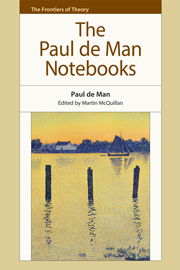Book contents
- Frontmatter
- Contents
- Series Editor's Preface
- Acknowledgements
- Dedication
- Introduction: ‘The Unimaginable Touch of Time’: The Public and Private in the Notebooks of Paul de Man
- PART I Texts
- 1 The Drawings of Paul Valéry (1948)
- 2 Jacques Villon (1952)
- 3 Graduate Essay on Keats (1954)
- 4 Postdoctoral Essay on Symbolism (c. 1960)
- 5 Introduction to Madame Bovary (1965)
- 6 Introduction to The Portable Rousseau (1973)
- 7 On Reading Rousseau (1977)
- 8 Translator's Introduction to “Rousseau and English Romanticism” (1978)
- 9 Rousseau and English Romanticism (1978)
- 10 Introduction to Studies in Romanticism (1979)
- 11 Hommage à Georges Poulet (1982)
- 12 A Letter from Paul de Man (1982)
- 13 Reply to Raymond Geuss (1983)
- 14 Interview with Robert Moynihan (1984)
- PART II Translations
- PART III Teaching
- PART IV Research
- Appendix. The Notebooks of Paul de Man 1963–83
- Bibliography
- Index of Names
14 - Interview with Robert Moynihan (1984)
from PART I - Texts
Published online by Cambridge University Press: 05 December 2014
- Frontmatter
- Contents
- Series Editor's Preface
- Acknowledgements
- Dedication
- Introduction: ‘The Unimaginable Touch of Time’: The Public and Private in the Notebooks of Paul de Man
- PART I Texts
- 1 The Drawings of Paul Valéry (1948)
- 2 Jacques Villon (1952)
- 3 Graduate Essay on Keats (1954)
- 4 Postdoctoral Essay on Symbolism (c. 1960)
- 5 Introduction to Madame Bovary (1965)
- 6 Introduction to The Portable Rousseau (1973)
- 7 On Reading Rousseau (1977)
- 8 Translator's Introduction to “Rousseau and English Romanticism” (1978)
- 9 Rousseau and English Romanticism (1978)
- 10 Introduction to Studies in Romanticism (1979)
- 11 Hommage à Georges Poulet (1982)
- 12 A Letter from Paul de Man (1982)
- 13 Reply to Raymond Geuss (1983)
- 14 Interview with Robert Moynihan (1984)
- PART II Translations
- PART III Teaching
- PART IV Research
- Appendix. The Notebooks of Paul de Man 1963–83
- Bibliography
- Index of Names
Summary
(Q) Let me ask you about your work on the concept of irony. There's a notorious exchange in a Hemingway novel when one of the characters thumbs his nose at the mention of the term. This may have been an oddity of response during the 1920s, but the same reaction no longer holds true, certainly, today. But why should irony, this emphasis on doubleness, tripleness, be so prominent in recent discussions of literature?
You speak of doubleness, tripleness, and so on, and you immediately ask the question in a historical context by asking what has happened now that irony is again emphasized. That's surely not the case – whether there is now more emphasis or less emphasis on irony, and how you would measure just how much irony. You know, you can't be a “little bit ironic.”
But nevertheless, what you speak of is true in a sense. What you are speaking of is a certain degree of self-consciousness, self-awareness, doubleness, and one always assumes this in any critical enterprise, because it is in the nature of that enterprise to work on something that already comes to you so that you have the impression of knowing more than one who went before and having yourself in a distancing relation to it. So, inherent in the critical act is a self-reflective act, and there is certainly, in irony, a self-reflective moment.
If one looks at it historically, the great moment as far as the theory of irony is concerned would not be contemporary, but would be Romantic irony in Germany in the early nineteenth century. If you want to go to the major texts on irony, you will not find them in contemporary writers. You would have to go back to at least the nineteenth century.
- Type
- Chapter
- Information
- The Paul de Man Notebooks , pp. 147 - 166Publisher: Edinburgh University PressPrint publication year: 2014

